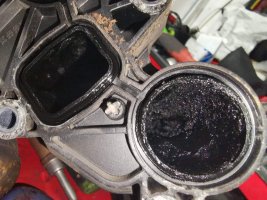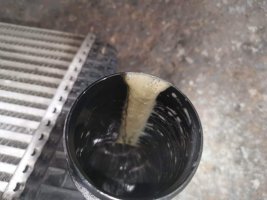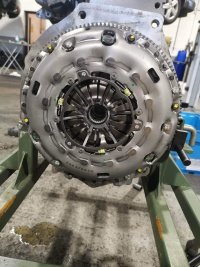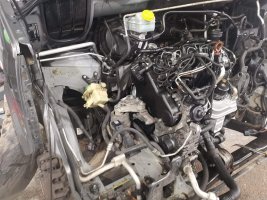Jukebox70
- Messages
- 71
- Vehicle
- T5 SE 180
I think that's going to have to be my next move.Load it to the gunwales and see if that ,ales a difference?
I think that's going to have to be my next move.Load it to the gunwales and see if that ,ales a difference?
Could you see the oil leak in your engine bay, I'd have thought with that amount of oil loss it would have coated the front of the engine? Let us know how the turbo turns out but I would have thought you'd see a lot of blue/greysmoke as your revs rise after an idle period if the turbo seals had gone. Good luck!Update. After having to do an emergency trip to London, I went over the 621 miles for the oil consumption test. I called the garage and told them I've gone over by 46 miles. Their reply was we'll need to do the test again. Another £300, i dont think so. I booked into another garage and said it was under warranty etc etc, they said I was losing oil from 2 places, dipstick seal and oil filter gasket. Also they've said oil leaking into turbo. My first thought is why the first garage just decided to do an oil consumption test when they could've just replaced dipstick seal and oil filter. I have my van back now for the time being whilst the garage is trying to sort the turbo out under warranty.
My question would be who fitted the Oil filter ?Update. After having to do an emergency trip to London, I went over the 621 miles for the oil consumption test. I called the garage and told them I've gone over by 46 miles. Their reply was we'll need to do the test again. Another £300, i dont think so. I booked into another garage and said it was under warranty etc etc, they said I was losing oil from 2 places, dipstick seal and oil filter gasket. Also they've said oil leaking into turbo. My first thought is why the first garage just decided to do an oil consumption test when they could've just replaced dipstick seal and oil filter. I have my van back now for the time being whilst the garage is trying to sort the turbo out under warranty.
I couldn't see any obvious sign of oil leaking. I thought the same about grey/ blue smoke but can see nothing. I did ask how they diagnosed the turbo problem and they said 'on the read out' .Could you see the oil leak in your engine bay, I'd have thought with that amount of oil loss it would have coated the front of the engine? Let us know how the turbo turns out but I would have thought you'd see a lot of blue/greysmoke as your revs rise after an idle period if the turbo seals had gone. Good luck!
The oil was fitted by the 2nd opinion garage. I will be collating all the evidence, and when its all sorted i think i'll have a good case to get that £300 back.My question would be who fitted the Oil filter ?
if it was by the garage that relived you of £300 ? I would be wording a strong letter demanding my money back (based on your second opinion)
if the oil loss was visually detected I would suggest the first garage. We’re not acting in your best interest and did not carry out their duty of care properly to investigate any potential simple issues to discount oil loss, before charging you for a test Scenario
Great news, let us know if the new turbo resolves the oil usage issues and I hope the refund for the oil consumption test goes OK.UPDATE!!!
After numerous calls and complaints to VW customer service, they have now agreed to replace the turbo under warranty. Also I am seeking a refund from the first garage that filled the van with oil for a consumption test. How different garages diagnose faults.
Whilst your vehicle is in having the Turbo done:UPDATE!!!
After numerous calls and complaints to VW customer service, they have now agreed to replace the turbo under warranty. Also I am seeking a refund from the first garage that filled the van with oil for a consumption test. How different garages diagnose faults.
I am (so far) a happy SE 180 2012 (CFCA engine) owner. Bought privately at around 181k km from a car dealer who imported it from Germany to NL.Thank you. As I have suggested and maintained. There is another factor/factors involved in this problem. VW may know/not know the actual chain of events but the combination , which leads to disintegration of the EGR, cannot be that common overall otherwise VW wouldn’t have been able to side step the issue.
Also, this is NOT the same as the 2010/2011 problem with the CFCA engine that was accepted by VW as due to a manufacturing problem and subsequently rectified. However there were a number of such vehicles , low milage Californias, Caravelles and conversions, that did not exhibit problems until years later. Originally they would have been covered by the warranty, but outside warranty VW would only offer a contribution. See the accompanying VW TPI.
So there are 2 problems with the CFCA engine in the 180. One has been addressed by VW , as it affected a certain batch of vehicles, and the other is intermittent affecting certain vehicles where certain conditions lead to the EGR disintegration.
View attachment 87809View attachment 87810View attachment 87811View attachment 87812View attachment 87813View attachment 87814View attachment 87815
Only VW can tell you if the engine was changed.I am (so far) a happy SE 180 2012 (CFCA engine) owner. Bought privately at around 181k km from a car dealer who imported it from Germany to NL.
Have no known oil issues today and hope if will stay that way. Will gauge levels much more frequently now I am aware.
Never the less researching the potential risk with this engine.
A few asks:
-How can I find out if my CFCA engine was fix under warranty by VW (nothing in maintenance log).
-Would my CFCA still get fixed with the compensation measure from VW if the issue would arise?
-I also understand that piston springs are often an issue. Is this indeed the case?
-Where/how can I check if my EGR is of type D?
-Will a more frequently oil-filter replacing help to de-risk?
-Was thinking to chip the engine for more torch and optimize fuel consumption (wishfully thinking?, today avg. 11 km/L highway usage). Would this be an added risk?
-How much oil is in the engine on the oil gauge stick max. fill level indication?
Thanks in advance!
Looks like my EGR is of type A.Only VW can tell you if the engine was changed.
I understand VW will probably not pay to replace the engine after 10 yrs and the milage it has done.
No idea about the piston rings.
There should be a label on top of the EGR valve with the Part Nos ending in A,B,C or D.
Mine is original and has no letter.
You can try more frequent oil changes. I doubt if it would make much difference. An Oil Test could show if you have a problem. High Aluminium levels are the key.
Having the engine chipped? Who knows. If you did I would be very surprised if the fuel consumption would improve unless you changed your driving style.
The dipstick measures 1 Litre between Maximum and Minimum.
My 2014 has just passed 108890 miles or 174384 km. Zero oil consumption between annual oil changes normally close to 20,000 miles/year.
I haven’t, and mines original.Looks like my EGR is of type A.
Will check who can do such an oil test in my area.
Best practice to replace the EGR with type D while no known issues yet?
Those who have blanked off the EGR have seen the aluminum oxide content of the oil go down. Inevitable conclusion, the aluminum comes from the disintegrating EGR cooler. Not all 180s are affected, but the problem is that no one knows which ones will be. It’s the smoking/lung cancer example: not every smoker gets lung cancer, but I will not smoke to find out if I will be one of the ones who do.I haven’t, and mines original.
The 2010/2011 CFCA engines had a problem, recognised by VW.
Post 2011 engines, some of them only, have a problem with excess oil consumption AND a damaged EGR. Whether the EGR is the root cause or another problem damages the engine and the EGR is open for debate but some owners have updated the EGR and still had the problem. It is your decision in the end.
No one is arguing that the Aluminium comes from the EGR oil cooler which is made of an Aluminium alloy. The question is Why do some EGRs disintegrate and some do not?Those who have blanked off the EGR have seen the aluminum oxide content of the oil go down. Inevitable conclusion, the aluminum comes from the disintegrating EGR cooler. Not all 180s are affected, but the problem is that no one knows which ones will be. It’s the smoking/lung cancer example: not every smoker gets lung cancer, but I will not smoke to find out if I will be one of the ones who do.
Excellent summary, the only known way so far to be sure that a 180’s EGR cooler doesn’t destroy the engine by feeding aluminum oxide into the intake is to do something illegal. I have no doubt that VW, with it’s enormous resources, knows exactly what causes this, but are keeping quiet. This is information that anyone considering buying a 180 should have, and once again shows the importance of this Forum.No one is arguing that the Aluminium comes from the EGR oil cooler which is made of an Aluminium alloy. The question is Why do some EGRs disintegrate and some do not?
Blanking off the EGR can have other consequences in some instances and in some jurisdictions is illegal.
Glad to hear it's fixed. Interesting that somebody called this at the very start of the thread!Finally!!!
VW garage after carrying out numerous oil consumption tests have finally found the problem. Catastrophic engine damage due to disintegrating EGR valve. Have now had a new engine fitted under the all in plan. Had to pay for a new DPF though. Hopefully I can now go back to enjoying and trusting my cali to take us to far off places without worrying oil issues.
Glad you got it all sorted.Finally!!!
VW garage after carrying out numerous oil consumption tests have finally found the problem. Catastrophic engine damage due to disintegrating EGR valve. Have now had a new engine fitted under the all in plan. Had to pay for a new DPF though. Hopefully I can now go back to enjoying and trusting my cali to take us to far off places without worrying oil issues.




Not wanting to be a kill joy, and I do hope the turbo was the fix, but you wouldn't be the first 180 owner to be fobbed off many times before they finally arrive at a buggered engine due to egr valve failure. I can risk saying this as you've still some warranty left I believe.Finally!!!
VW garage after carrying out numerous oil consumption tests have finally found the problem. Catastrophic engine damage due to disintegrating EGR valve. Have now had a new engine fitted under the all in plan. Had to pay for a new DPF though. Hopefully I can now go back to enjoying and trusting my cali to take us to far off places without worrying oil issues.
@Jukebox70 got a new engine from VW, see above.Not wanting to be a kill joy, and I do hope the turbo was the fix, but you wouldn't be the first 180 owner to be fobbed off many times before they finally arrive at a buggered engine due to egr valve failure. I can risk saying this as you've still some warranty left I believe.
The turbo wasn't the problem, it was the engine. Now all replaced under the warranty, also just getting a refund for the DPF.Not wanting to be a kill joy, and I do hope the turbo was the fix, but you wouldn't be the first 180 owner to be fobbed off many times before they finally arrive at a buggered engine due to egr valve failure. I can risk saying this as you've still some warranty left I believe.
Sorry to you (and thanks @KGCali ). I missed the short update in all the pages of certain folk denying the problem. Very glad you got a proper fix.The turbo wasn't the problem, it was the engine. Now all replaced under the warranty, also just getting a refund for the DPF.

The VW California Club is the worlds largest resource for all owners and enthusiasts of VW California campervans.

